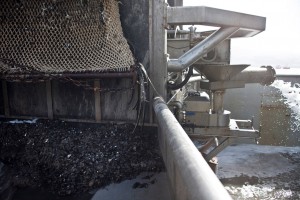19th March 2014 Warsaw, Poland
WHERE’S MY CHEESE? – The GREAT British Food Tour 2014 (part 7)
My name’s Trevor and I’m a Bangor Mussel man. I beg your pardon sir….What I meant to say is that I produce and purvey the finest Welsh Mussels to prestigious Amsterdam and Paris tables. The French and the Dutch love mussels and so do we!
Mussels have the most impressive nutritional profile of all shellfish. They contain high levels of highly desirable long chain fatty acids EPA and DHA. These fats have many beneficial effects, including improving brain function and reducing inflammatory conditions, such as arthritis. Mussels are also a brilliant source of vitamins. Plus they give you a shot of important minerals, such as zinc, which helps build immunity. Mussels even contain levels of iron and folic acid to rival red meats.
In 2006 shellfish contributed 48% of the total seafood landings by UK vessels into the UK (demersal finfish and pelagic finfish contributed 37% and 15% respectively), around £240 million and 32% of the volume of seafood landed. Cultivated shellfish contributed an additional £23 million, from just over 29,000 tonnes.” Shellfish Association of Great Britain (SAGB).
Mussels make up 40-50% of total gross turnover of Welsh fisheries – and this from an industry that has been operating sustainably for over 50 years. Due to the unique topography of the Menai Strait, we are the only mussel fishery in the UK that can farm mussels extensively and sustainably. By farming mussels in harmony with the environment, we enrich the biodiversity of the mud flats encouraging wildlife to flourish. There is more information about this in the Environment section of the website.
A Mussel man’s Calendar
Year 1
The cycle begins in the summer when mussel seeds (spat) are collected from surrounding waters, such as Morecambe Bay, Caernarfon and Conwy, and planted in the mud flats that we farm. There are strict controls on how we collect and plant mussels and we follow a Code of Good Practice. In the first year, the mussels are planted as far inshore as possible – they are exposed at high tide and provide food for oyster catchers. They are planted at a particular density and in the first year they grow shell thickness.
Year 2
In Year 2, the mussels are moved further out to sea where there is an increased food source. As they are now underwater for longer, they filter for longer and growth takes place both for meat content and shell length. The mussels are a food source for more fish, octopus, whelks as well as other marine animals. We follow strict environmental controls to ensure that the farming process is as low-impact as possible and our checks to ensure all the mussels are not eaten follow very stringent standards as the mussel beds are within a Special Area of Conservation and Marine Nature Reserve. These conditions ensure that the mussel beds are of benefit to the natural marine environment as well as the aquaculture industry and consumers.
Year 3
In Year 3, the mussels are moved to deep water and are now covered by sea all of the time. The mussels now continue to grow in meat content and shell length and can be harvested when required. Harvesting processes are rigorously monitored by environmental bodies so that they are not a risk to the marine and coastal environment. Overall, the mussel fisheries practices that we follow provide positive benefits to the marine environment by maintaining an important food source.
The GREAT Big Mussel Harvest!
Harvested Mussels

Once mussels have been harvested, they need to be depurated (cleaned and prepared by immersion in clean water for 42 hours). Then they are ready to be distributed. Currently 100% of Menai Mussels are exported to Holland, Ireland and France. This is set to change as the local demand for locally sourced foods has increased and discussions are underway with local markets, supermarkets, restaurants and hotels so that delicious Welsh mussels can be farmed, harvested, prepared and eaten here in North Wales with benefits for the environment as well as the local population and visitors!
Thanks Trev for a GREAT intro. You know what I think – we need to taste some. Bon Appetit!